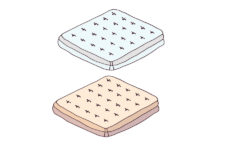Two big updates for residential properties are coming in 2019 – allergen hazard regulations and bedbug reporting requirements:
Bedbug Reporting Due
Per Local Law 69 of 2017, owners of multiple dwellings are now required to file bedbug infestation and treatment reports with HPD annually. The first due date for this new requirement is January 31, 2019.
For this initial filing, HPD requests information from November 2017 through November 2018. For next year’s submission, owners must report information from December 1, 2018 through December 31, 2019.
Owners must attempt to obtain information from the tenant or unit owner, and include the following in their reports:
- The number of dwelling units;
- The number of dwelling units, as reported or otherwise known to the owner, that had a bedbug infestation during the previous year;
- The number of dwelling units, as reported or otherwise known to the owner, in which eradication measures were employed during the previous year for a bedbug infestation;
- The number of dwelling units reported in number 3 that had a bedbug infestation after such eradication measures were employed in such units.
Regarding “as reported or otherwise known to the owner” – if you are unable to reach the tenant, you may be able to obtain information from your pest control vendor or other resources (staff members, etc.). Consult with your attorney, vendor, and team to determine the best way to gather information after you’ve attempted to reach your tenants.
Only validly registered owners or managing agents can submit reports online. Once reports are filed, HPD will make report information publicly available on their website.
In addition to submitting reports, owners are also responsible for distributing a copy of the electronic report form to each tenant during lease renewal/new lease commencement OR posting the report form in a prominent location in the building within 60 days of filing. Finally, owners must distribute or post a notice providing information about the prevention, detection, and removal of bedbugs.
As a reminder, this is separate from and in addition to the New York State Bedbug Disclosure Form requirement.
Local Law 55: Indoor Allergen Hazard Management
HPD’s latest rule goes into effect on Wednesday, January 16th. These rules clarify Local Law 55 of 2018 requirements to investigate and remediate indoor allergen hazards, including mold, cockroaches, mice, and rats.
Per HPD, “Effective January 19th, 2019… an owner of a multiple dwelling(s) will be required to annually inspect units for indoor allergen hazards, such as mice, cockroaches, rats, and mold.”
Here’s a breakdown of components in the new law:
Required Notification to Tenants
All leases offered to tenants or prospected tenants “must contain a notice, prominently displayed within, which advises tenants of the obligations of the owner…” Full text of the required notice can be seen in the Final Enacted Rules (Appendix A – in English and Spanish), below in the resource box. Additionally, owners must provide tenants or prospective tenants a DOHMH pamphlet informing them of these requirements. As of December 27, 2018, the DOHMH pamphlet is not yet available. Stay tuned for updates here, likely before the January 19th effective date.
Postpone Correction Due Dates
Owners may apply for postponement of HPD violation correction due dates “within the five days preceding the date set for correction of such violation.”
- Postponements for hazardous violations that become immediately hazardous violations per the new law (mold-related – section 27-2017.3a(4) or (5))
- Granting of postponements are at the sole discretion of HPD. They will be limited to circumstances where owners show that they have “taken prompt action to correct the violation but that full correction cannot be completed within the time provided because of serious technical difficulty, inability to obtain necessary materials, funds or labor, or inability to gain access to the dwelling unit where the violation exists, or other such portion of the building necessary to make the required repair.”
The new rule outlines what’s required in postponement applications, and will respond to applications in writing. Granted postponements “shall not exceed fourteen days from the initial date set for correction.”
Work Practices
Owners must use integrated pest management procedures, outlined in the new law, to address and remediate infestations, as well as specific work practices to assess and correct indoor mold hazards (including underlying defects, like leaks). There are detailed requirements and guidelines for each allergen type in the Rules. Separately, violation certifications for each must now include affidavits stating that work practices were properly performed in accordance with these rules.



